Physiotherapy
UCAS code B160
- Study mode
- Full-time
- Duration
- 3 years
- Start date and application deadlines
-
- Start date
UCAS code B160
Our Physiotherapy programme is a modern, thought-provoking programme that enables students to develop the skills and experience to flourish as a physiotherapist in the modern healthcare environment.
A broad range of learning opportunities ensures that learning is accessible to students expressing different learning styles and preferences. Alongside academic and professional skills you will gain an excellent range of practical experience in a wide range of settings. The programme at Liverpool will encourage you to become independent, resourceful and able to meet the exciting challenges of healthcare today.
This programme is designed to reflect current physiotherapy practice with research evidence underpinning all aspects of our teaching.
Alongside academic and professional skills you will gain an excellent range of practical experience in a wide range of settings. The programme at Liverpool will encourage you to become independent, resourceful and able to meet the exciting challenges of healthcare today.
The programme adopts a modular approach to the delivery of content. It incorporates both university taught and practice-based components which have been designed together as an integrated whole.
Key transferable skills are embedded into the curriculum at every level so that individuals are equipped to effectively manage their personal and professional development following graduation.

We’re proud to announce we’ve been awarded a Gold rating for educational excellence.
Discover what you'll learn, what you'll study, and how you'll be taught and assessed.
First year studies provide a foundation to profession specific practical skills and core knowledge, primarily focussing on the structure and function of tissues found within the human body.
During first year, we enable students to develop their independent learning strategies as well as their teamwork, communication and interpersonal skills.
Key themes include:
Programme details and modules listed are illustrative only and subject to change.
In year two, you will continue to grow your skills and knowledge through academic study and practical experience with a particular emphasis placed on pathology.
Key themes include:
Programme details and modules listed are illustrative only and subject to change.
Your final year will be dedicated to the development of advanced skills and techniques, and the ability needed to apply them in practice.
In third year, we will:
Programme details and modules listed are illustrative only and subject to change.
Our curriculum has been designed to reflect current practice with research evidence underpinning all aspects of our teaching.
Learning is promoted through a wide variety of activities that enable students to become autonomous and continuous learners, using a broad range of learning opportunities to allow students to expressing different learning styles and preferences.
Interactive lectures, practical and clinical skills group work, simulation, directed study, role play, problem based learning, small group work, student-led seminars, collaborative project work and interactive tutorials will all prove to be key components of your learning experience.
Practical work using our imaging suite digital equipment, 3D virtual reality radiotherapy facility, Clinical Skills Resource Room and the Human Anatomy Resource Centre complement teaching activities. Face-to-face interactions between all students will occur at shared lectures, tutorials and group work and online interaction will be encouraged and facilitated.
We also encourage inter-professional learning opportunities which mirror the modern, collaborative environments of the modern healthcare industry.
Using a mixture of coursework and examinations, a range of assessment methods are used across this programme. These include seen and unseen written examinations, essay assignments with specific word lengths, multiple choice questions, case study presentations, video analysis and interactive practical examinations.
Assessment of the work-based learning element of all programmes is an important aspect. You will be required to communicate your views orally and in written form; analyse, implement and evaluate your practice; and to extend the research and evidence base of your chosen profession.
The various methods of assessments have been chosen to provide a balance that will permit the undergraduates to properly demonstrate their intellectual abilities in all areas.
We have a distinctive approach to education, the Liverpool Curriculum Framework, which focuses on research-connected teaching, active learning, and authentic assessment to ensure our students graduate as digitally fluent and confident global citizens.
The Liverpool Curriculum framework sets out our distinctive approach to education. Our teaching staff support our students to develop academic knowledge, skills, and understanding alongside our graduate attributes:
Our curriculum is characterised by the three Liverpool Hallmarks:
All this is underpinned by our core value of inclusivity and commitment to providing a curriculum that is accessible to all students.
The qualifications and exam results you'll need to apply for this course.
| Qualification | Details |
|---|---|
| A levels |
AAB (including Biology) |
| GCSE |
6 GCSE subjects grade A*-B/Level 6 including English Language, Mathematics and two Sciences from the following: Biology, Chemistry, Physics, PE, Core Science, Additional Science and Dual Science. Standalone English Literature is not accepted in lieu of English or English Language at grade B (GSCE). Applied GCSEs will not be considered. |
| BTEC Level 3 national extended diploma |
D*D*D in Health and Social Care or Sport and Exercise Science. BTEC National Extended Certificate D plus AA in Biology or PE or Sport Science and the Active Leisure Industry. Pass required in science practicals. Acceptable second sciences: Applied ICT; Biology (and Human Biology); Chemistry; Computer Science; Economics; Electronics; Environmental Science; Further Mathematics; Geography; Geology; ICT; Life and Health Sciences; Mathematics; Psychology; Physics; Statistics. |
| BTEC combinations |
BTEC National Extended Certificate D plus AA including Biology Or PE or Sport Science and the Active Leisure Industry. BTEC Level 3 National Diploma in Health & Social Care will be considered at grade D*D plus Including Biology Or PE or Sport Science and the Active Leisure Industry at grade A. |
| Welsh Baccalaureate Advanced |
B in the Welsh Baccalaureate, plus grades AA at A level to include Biology or PE or Sport Science and the Active Leisure Industry. |
| Access |
Pass relevant Access to HE Diploma with 45 Level 3 credits with 36 at Distinction and 9 at Merit |
Studying with us means you can tailor your degree to suit you. Here's what is available on this course.
University of Liverpool students can choose from an exciting range of study placements at partner universities worldwide.
Spend a summer abroad on a study placement or research project at one of our worldwide partner institutions.
Every student at The University of Liverpool can study a language as part of, or alongside their degree. You can choose:
Physiotherapy students benefit from the School of Allied Health Professions and Nursing‘s experience in delivering over 100 years of dynamic, research-led teaching. Our student satisfaction rates, which range from 93-100%, are testament to our School being a great place to start to your career.
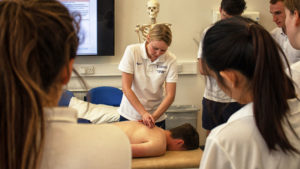
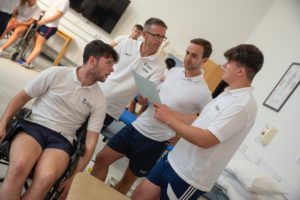
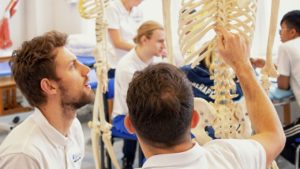
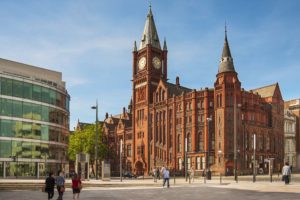
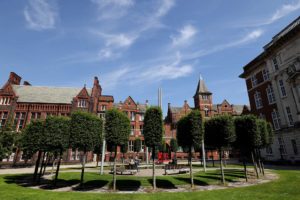
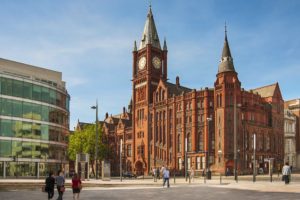
From arrival to alumni, we’re with you all the way:

Want to find out more about student life?
Chat with our student ambassadors and ask any questions you have.
A Physiotherapy degree from the University of Liverpool can set you up for a rewarding and challenging career in a diverse range of professional environments. Physiotherapy graduates are eligible to apply for membership of the Health and Care Professions Council (HCPC) and the Chartered Society of Physiotherapy.
Many graduates find employment in the NHS, in industry, private practice, sport, research or teaching.
You will have gained a qualification that meets the Government’s criteria for ‘fitness for purpose’ and ‘fitness for practice’.
There are many employment opportunities for physiotherapists to work in a wide range of clinical settings, from paediatrics to older persons’ care. Your UK qualification also provides an opportunity to work abroad in many countries.
You’ll be taught a curriculum that is developed and assessed by leading healthcare providers, such as:
Many such partners across the North West provide you with exciting placement opportunities.
99% of School of Allied Health Professions and Nursing’s students find their main activity after graduation meaningful.
(Graduate Outcomes, 2018-19.)
Your tuition fees, funding your studies, and other costs to consider.
Full-time place, per year - £9,535
Year abroad fee - £1,430 (applies to year in China)
Full-time place, per year - £29,100
Year abroad fee - £14,550 (applies to year in China)
The tuition fees shown are correct for 2025/26 entry. Please note that the year abroad fee also applies to the year in China.
Tuition fees cover the cost of your teaching and assessment, operating facilities such as libraries, IT equipment, and access to academic and personal support. Learn more about paying for your studies.
We understand that budgeting for your time at university is important, and we want to make sure you understand any course-related costs that are not covered by your tuition fee. This may include a laptop, books, or stationery. Additional costs for this course could include equipment, professional association fees and travel to placements.
Stationery and equipment
Practical kit: £120
Professional association fees
Optional Chartered Society of Physiotherapy Student Membership: £42 per year
Travel to placements
Students will complete 30 weeks of core placement experience. In year one, students undertake a one-week observation placement in the Merseyside area.
All placements are a daily commute, therefore additional accommodation costs are not incurred.
Student concessions are also available from local travel companies.
Elective placements
At the end of year two, students undertake a four-week elective placement, either in the UK or overseas, which is self-funded.
* Home students are able to apply for reimbursement of travel/accommodation costs in relation to placement from the NHS Business Services Authority.
We offer a range of scholarships and bursaries that could help pay your tuition and living expenses.
If you’re a UK student joining an undergraduate degree and have a household income below £35,000, you could be eligible for a Liverpool Bursary worth up to £2,000 for each year of undergraduate study.
If you’ve spent 13 or more weeks in Local Authority care since age 14, you could be eligible for a bursary of £3,000 per year of study. You’ll need to be a UK student joining an eligible undergraduate degree and be aged 28 or above on 1 September in the year you start.
Are you a UK student with a Black African or Caribbean heritage and a household income of £25,000 or less? You could be eligible to apply for a Cowrie Foundation Scholarship worth up to £8,000 for each year of undergraduate study.
If you’re a UK student identified as estranged by Student Finance England (or the equivalent UK funding body), you could be eligible for a bursary of £1,000 for each year of undergraduate study.
Joining a School of Biosciences degree and have a household income of less than £25,000? If you’re a UK student, you could apply to receive £4,500 per year for three years of your undergraduate course.
Do you live in the Liverpool City Region with a household income of £25,000 or less? Did neither of your parents attend University? You could be eligible to apply for a Nolan Scholarship worth £5,000 per year for three years of undergraduate study.
Are you a UK student with a household income of £25,000 or less? If you’ve participated in an eligible outreach programme, you could be eligible to apply for a Rigby Enterprise Award worth £5,000 per year for three years of your undergraduate degree.
Are you a UK student with a household income of £25,000 or less? Did neither of your parents attend University? You could be eligible to apply for a ROLABOTIC Scholarship worth £4,500 for each year of your undergraduate degree.
Apply to receive tailored training support to enhance your sporting performance. Our athlete support package includes a range of benefits, from bespoke strength and conditioning training to physiotherapy sessions and one-to-one nutritional advice.
Joining a degree in the School of Electrical Engineering, Electronics and Computer Science? If you’re a UK student with household income below £25,000, you could be eligible to apply for £5,000 a year for three years of study. Two awards will be available per academic year.
Joining a Nursing, Occupational Therapy or Physiotherapy degree? If you’re a UK student with a Merseyside connection and a household income below £25,000, you could be eligible to apply for a £2,500 payment for each year of your course. Six awards are available per year.
If you’re a young adult and a registered carer in the UK, you might be eligible for a £1,000 bursary for each year of study. You’ll need to be aged 18-25 on 1 September in the year you start your undergraduate degree.
Use our handy chatbot for your Clearing enquiries.
Last updated 19 June 2025 / / Programme terms and conditions